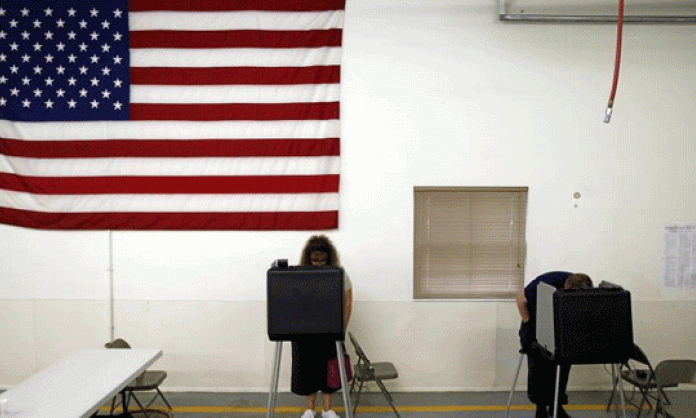The recent mid-term elections in the US reflect the further shift to the right in capitalist politics.
The obvious aspect of this is that the Republicans won control of the Senate, increased their majority in the House and won more state governorships.
An editorial in The New York Times titled “Dark money helped win the Senate” discussed one aspect of how the result came to pass. “The next Senate was just elected on the greatest wave of secret, special-interest money ever raised in a congressional election”, it pointed out.
The editorial concluded, “Political operatives say this year was just a dress rehearsal for 2016, when there will be even more money, much of it secret, all benefiting the interests of the richest and best connected Americans. Given big money’s influence … the chances for limiting it are more distant than ever.”
In this election, a majority of the big money went to the Republicans, who spearhead the bipartisan assault on the wages, conditions and rights of working people.
Another notable aspect was low voter turnout. Only one-third of registered voters bothered to vote. If we include the large numbers of unregistered and deregistered, the percentage of the adult population who voted for the Republicans is less than 15 percent.
The issue of the deregistered has been generally given short shrift in the media. One aspect is the huge prison population, and even ex-prisoners, denied the right to vote; they are disproportionately Black and Latino.
In addition, there has been a concerted effort in Republican-controlled states to attack the right to vote of Blacks, Latinos, Asians and students.
This rollback of the gains of the Black liberation movement of the 1960s and 1970s has been carried out through various schemes and new laws making it harder for lower income workers to be registered to vote. In many areas, college students have been blocked from voting by complicated residency rules.
All of the above factors are part of the picture. Rulings by the most reactionary Supreme Court in decades paved the way.
One ruling gutted the Voting Rights Act, won by the civil rights movement in the 1960s, which opened the floodgates for states to attack the voting rights of Blacks and other oppressed nationalities.
Another was a series of decisions equating money with “free speech”, and corporations with people, opening another floodgate of big money flagrantly buying candidates at obscene levels.
In the history of capitalist democracies, the ruling rich have always dominated politics, whatever their rules on election financing have been.
In the 20th and current centuries, this has been carried out in the US by their control of the Democratic and Republican parties. But in recent years the blatant domination of big money has never been more openly evident and thoroughly corrupting.
It’s the economy …
Yet for all the big money, the Republicans did not so much win this election as the Democrats lost it, by scarcely differentiating from the Republicans.
Nowhere has this been clearer than on the economy. While the anaemic recovery after the Great Recession shows some signs of a possible acceleration, and the stock market and profits are soaring, wages have stagnated or dropped. For the average worker and lower middle class, the recession continues. For Blacks and Latinos, especially youth, the situation is dire.
Everyone knows that inequality is getting greater, with the top 10 percent making gains, the top 1 percent raking in even more dough and the top 0.1 percent really jumping ahead of the next 0.9 percent.
Incomes for the bottom 90 percent are stagnating or dropping. Here the Democrats had virtually nothing to offer – except their deplorable record.
In the midst of the financial crisis, they carried out a seamless transition from the Bush to the Obama administration. The bipartisan agenda was to bail out the “too big to fail” financial institutions at the centre of the crisis. While trillions in outright gifts and loans were showered on these institutions, no help was given to the millions of working class families whose homes were foreclosed by the banks.
In the years since, the Obama administration refused to bring criminal charges against the individuals who violated even capitalist laws in their feeding frenzy leading up to the crisis. Instead, there have been fines imposed on some of the institutions, which they write off as business expenses.
In addition to “too big to fail”, the Democratic administration, with full Republican support, added “too big to jail”.
The two Obama administrations did nothing substantial to aid the unemployed and underemployed during the recession and its aftermath.
For example, Obama did not launch a program to hire the unemployed to rebuild the country’s ageing infrastructure of roads, bridges, railways and blighted cities. Such projects could have greatly reduced unemployment, as well as bettering the country for everyone.
But the Democrats, trailing the Republicans, went in the opposite direction and slashed government spending – at federal, state and local levels – on services like education, fire departments, veterans’ benefits, food aid and unemployment payments.
Along the same lines, there have been bipartisan drives to privatise education and other government services.
Much of this was done by the Democrats with the excuse that “compromise” had to be reached with the Republicans.
So what could the Democrats offer in these elections but more of the same policies they have been following?
No wonder that tens of millions didn’t bother to vote. But there was one result that did indicate that, if there had been a mass workers’ party that put forward a pro-worker program, it could have had an effect.
There were referendums in some states and cities proposing a rise in the minimum wage, and these for the most part won.
Significantly, these referendums won even in four states that voted Republican.










